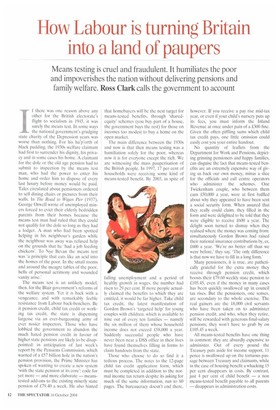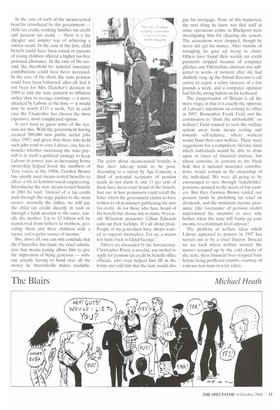How Labour is turning Britain into a land of paupers
Means testing is cruel and fraudulent. It humiliates the poor and impoverishes the nation without delivering pensions and family welfare. Ross Clark calls the government to account
1 f there was one reason above any other for the British electorate's flight to socialism in 1945, it was surely the means test. In some ways the national government's grudging state charity of the Depression years was worse than nothing. For his ha'p'orth of black pudding, the 1930s welfare claimant had first to surrender his dignity, his privacy and in some cases his home. A claimant for the dole or the old age pension had to submit to inspection by the means test man, who had the power to enter his home and order him to dispose of every last luxury before money would be paid. Tales circulated about pensioners ordered to sell dining chairs or pictures from their walls. In The Road to Wigan Pier (1937), George Orwell wrote of unemployed miners forced to evict their elderly bedridden parents from their homes because the means test man had ruled that they could not qualify for the dole so long as they had a lodger. A man who had been spotted helping in his neighbour's garden while the neighbour was away was refused help on the grounds that he had a job feeding chickens'. To Nye Bevan the means test was 'a principle that eats like an acid into the homes of the poor. In the small rooms and around the meagre tables of the poor, hells of personal acrimony and wounded vanity arise.'
The means test is an unlikely model, then, for the Blair government's reforms of the welfare system. Yet it is back with a vengeance, and with remarkably feeble resistance from Labour back-benchers. Be it pension credit, child tax credit or working tax credit, the state is dispensing largesse via an ever-burgeoning army of ever nosier inspectors. Those who have lobbied the government to abandon the much hated pension credit in favour of higher state pensions are likely to be disappointed: in anticipation of last week's report by the Pensions Commission, which warned of a £57 billion hole in the nation's pension provision, the Prime Minister has spoken of wanting to create a new system 'with the state pension at its core': code for yet more — and more elaborate — meanstested add-ons to the existing miserly state pension of £79.40 a week. He also hinted
that homebuyers will be the next target for means-tested benefits, through 'sharedequity' schemes (you buy part of a house, the government buys the rest) for those on incomes too modest to buy a home on the open market.
The main difference between the 1930s and now is that then means testing was a humiliation solely for the poor, whereas now it is for everyone except the rich. We are witnessing the mass pauperisation of the British people. In 1997, 17 per cent of households were receiving some kind of means-tested benefit. By 2003, in spite of falling unemployment and a period of healthy growth in wages, the number had risen to 29 per cent. If more people actually claimed the benefits to which they are entitled, it would be far higher. Take child tax credit, the latest manifestation of Gordon Brown's 'targeted help' for young couples with children, which is available to nine out of every ten families — namely the six million of them whose household income does not exceed £58,000 a year. Suddenly successful people who have never been near a DSS office in their lives have found themselves filling in forms to claim handouts from the state.
Those who choose to do so find it a tedious process. The notes to the 12-page child tax credit application form, which must be completed in addition to the normal income tax return despite its asking for much of the same information, run to 60 pages. The bureaucracy doesn't end there,
however, If you receive a pay rise mid-tax year, or even if your child's nursery puts up its fees, you must inform the Inland Revenue at once under pain of a £300 fine. Given the often piffling sums which child tax credit pays, one little omission could easily cost you your entire handout.
No quantity of leaflets from the Department for Work and Pensions, depicting grinning pensioners and happy families, can disguise the fact that means-tested benefits arc an extremely expensive way of giving us hack our own money, minus a slice for the officials and call centre operators who administer the schemes. One Twickenham couple, who between them earn £50,000 a year, were at first baffled about why they appeared to have been sent a social security form. When assured that they really could claim, they filled in the form and were delighted to be told that they were eligible to receive £600 a year. The delight soon turned to dismay when they realised where the money was coming from: simultaneously Gordon Brown had raised their national insurance contributions by, er, £600 a year. 'We're no better off than we were before,' they say. 'The only difference is that now we have to fill in a long form; Many pensioners, it is true, are pathetically grateful for the extra money they receive through pension credit, which boosts their £79.60 weekly state pension to £105.45, even if the money in many cases has been quickly swallowed up in council tax rises. But the pensioners, one senses, are secondary to the whole exercise. The real gainers are the 18,000 civil servants who have been taken on to administer pension credit, and who, when they retire, will be rewarded with generous final-salary pensions; they won't have to grub by on £105.45 a week.
All means-tested benefits have one thing in common: they are absurdly expensive to administer. Out of every pound the Treasury puts aside for income support, 11 pence is swallowed up on the tortuous passage between Treasury and claimants, while in the case of housing benefit a whacking 15 per cent disappears in costs. By contrast, just 4 per cent of child benefit — a non means-tested benefit payable to all parents — disappears in administration costs.
In the case of each of the means-tested benefits introduced by this government — child tax credit, working families tax credit and pension tax credit there is a far cheaper and simpler way of achieving a similar result. In the case of the first, child benefit could have been raised or parents of young children offered a higher tax-free personal allowance. In the case of the second, the threshold for national insurance contributions could have been increased. In the case of the third, the state pension could have been bolstered: after all, had it not been for Mrs Thatcher's decision in 1980 to link the state pension to inflation rather than to average earnings — a move attacked by Labour at the time — it would now be worth £113 a week. Yet in each case the Chancellor has chosen the most expensive, most complicated option.
It isn't hard to guess some of the reasons for this. With the government having created 500,000 new public sector jobs since 1997, and given that those who hold such jobs tend to vote Labour, one has to wonder whether increasing the state payroll is in itself a political strategy to keep Labour in power, just as increasing home ownership helped boost the numbers of Tory voters in the 1980s. Gordon Brown has openly used means-tested benefits to effect a bit of feminist social engineering. Introducing the new means-tested benefit in 2001 he said: 'Instead of a tax credit paid through the wage packet to the main earner, normally the father, we will pay the child lax credit directly in cash or through a hank account to the carer, usually the mother. Up to £2 billion will be transferred from fathers to mothers, providing them and their children with a secure and regular source of income.'
But, above all, one can only conclude that the Chancellor has made the cruel calculation that means testing allows him to give the impression of being generous — without actually having to hand over all the money he theoretically makes available. The point about means-tested benefits is that their take-up tends to be poor. According to a survey by Age Concern, a third of potential recipients of pension credit do not claim it, and 11 per cent of them have never even heard of the benefit. Just one in four pensioners could recall the letter which the government claims to have written to all pensioners publicising the new tax credit. As for those who have heard of the benefit hut choose not to claim, 84-yearold Wilmslow pensioner Lillian Edwards sums up their feelings: 'It's all about pride. People of my generation have always wanted to support themselves. For us, a means test harks hack to Lloyd George.'
Others are dissuaded by the bureaucracy. Christopher Priest, a novelist, was invited to apply for pension tax credit by benefit office officials, who even helped him fill in the forms and told him that the state would also pay his mortgage. None of this happened; the next thing he knew was that staff at some operations centre in Blackpool were investigating him for cheating the system. The accusations were dropped, though he never did get his money. After months of wrangling he gave up trying to claim. Others have found their weekly tax credit payments stopped because of computer glitches; one Oxfordshire claimant was subjected to weeks of torment after she had dutifully rung up the Inland Revenue's call centre to report a salary increase of a few pounds a week, and a computer operator had hit the wrong button on his keyboard.
The pauperisation of Britain is all the more tragic in that it is exactly the opposite of Labour's intentions on coming to office in 1997, Remember Frank Field and the commission to 'think the unthinkable' on welfare? Field wanted to turn the welfare system away from means testing and towards self-reliance, where workers would fund their own welfare. There were suggestions for a compulsory lifetime fund which individuals would be able to draw upon in times of financial distress, but whose contents, in contrast to the black hole that is national insurance contributions, would remain in the ownership of the individual. We were all going to be encouraged to save through 'stakeholder' pensions, attuned to the needs of low earners. But then Gordon Brown raided our pension funds by abolishing tax relief on dividends, and the minimum income guarantee (the forerunner of pension credit) undermined the incentive to save: why bother when the state will bump up your income to a minimum level anyway?
The plethora of welfare ideas which Labour appeared to possess in 1997 has turned out to be a cruel illusion. Instead we are back where welfare started: the masses scooped up by the cold charity of the state, their financial lives stripped bare before being proffered crumbs, courtesy of a means test man on a fat salary.











































































































 Previous page
Previous page